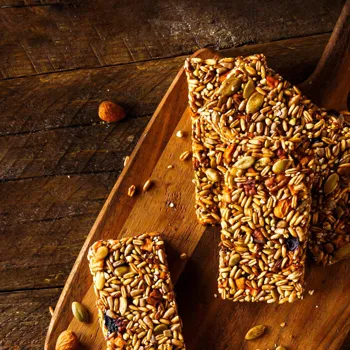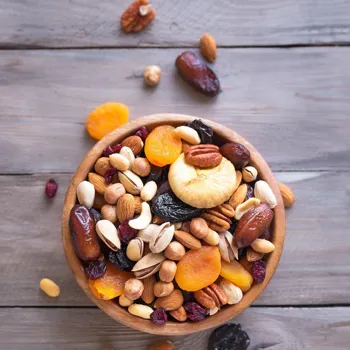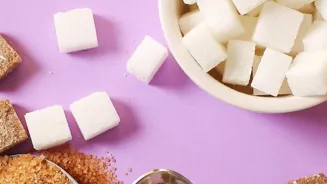Unravel 10 Hidden Sugar Sources in Your Diet & How to Avoid Them. Dive in & protect your health!
Namaste, readers! Are you trying to cut down on sugar? Good thinking! Too much sugar can lead to weight gain,
skin issues, and even bigger problems down the line. But sugar is sneaky! It hides in places you wouldn't expect.
Let's uncover these hidden sources and learn how to avoid them, keeping your chai sweet but your health even sweeter.
Breakfast Cereals: Wake Up to the Truth.Many breakfast cereals, especially those marketed towards children, are loaded with sugar. Think about those colorful boxes with cartoon characters! They often contain more sugar than you'd find in a dessert. All the sweetness isn't always from natural ingredients either and it's often added sugars that give you a quick energy boost that leaves you sluggish. Moreover, the sugar content is often masked under different names, making it tricky for the common consumer to take a informed decision. This makes the problem more of a stealthy one for the unknowing health enthusiast.
The Solution: Read the nutrition label very carefully. Look for cereals with less than 5 grams of sugar per serving. Choose whole-grain options like plain oatmeal or unsweetened shredded wheat. Add your own sweetness with fresh fruits like berries or a drizzle of honey (in moderation, of course!).
A bowl of oats with a sprinkle of nuts and seeds makes a perfect start to the day and is one less sugary start to avoid.
Yogurt: A healthy snack with hidden sugar pitfalls
Yogurt can be a healthy snack, packed with protein and probiotics. But flavored yogurts, even those labeled "low-fat," often contain a surprising amount of added sugar. Fruit-on-the-bottom yogurts are notorious offenders.

So while you are trying to avoid too much oil and junk, make sure your choice isn't adding to the intake of sugar. The "healthy" image makes it all the more deceptive, especially to the consumers.
The Solution
Opt for plain, unsweetened yogurt (Greek yogurt is a great choice for extra protein). Sweeten it yourself with fresh fruit, a touch of honey, or a sprinkle of cinnamon. You'll control the amount of sugar and get the added benefits of fiber and antioxidants from the fruit.
Using natural sweeteners is always a better option to refine ones.
Sauces and dressings pack hidden sugars, impacting health
You might not think of sauces and dressings as sugar bombs, but many contain a surprising amount. Ketchup, barbecue sauce, salad dressings (especially those labeled "sweet" or "honey"), and even some pasta sauces can be packed with added sugars.
The problem, more often than not is the large volume of such sauces people use in their food. More sauce, more sugar, more problems!
The Solution
Read the labels carefully and choose low-sugar alternatives. Better yet, make your own sauces and dressings at home. It's easier than you think! You can control the ingredients and avoid unnecessary added sugars.
A simple vinaigrette with olive oil, vinegar, and herbs is a flavorful and healthy option.
Commercial bread often contains added sugar for improved taste
While bread isn't typically considered a sweet food, many commercially produced breads contain added sugar to improve texture and taste. White bread, in particular, is often higher in sugar than whole-wheat varieties.
The main benefit is the sweetness that comes with chewing and many brands include sugar for an extra touch.
The Solution
Choose whole-grain or whole-wheat bread with minimal added sugar. Look for breads with less than 2 grams of sugar per slice. Alternatively, explore sourdough bread, which often has a lower glycemic index and less added sugar.
Canned foods have added sugars for preservation
Canned fruits and vegetables are convenient, but they're often packed in sugary syrups or sauces. Even canned beans can contain added sugar. The goal is to add to the shelf-life of food items. Manufacturers sometimes use sugar as an effective and cost-effective preservative measure.
The Solution
Choose canned fruits and vegetables packed in water or their own juice. Rinse them before using to remove any excess sugar. Alternatively, opt for frozen fruits and vegetables, which are often just as nutritious as fresh and don't contain added sugar.
Granola bars marketed as healthy may contain high sugar content
Granola bars are often marketed as healthy snacks, but many are loaded with sugar, especially those with chocolate chips, honey or other sweet additions. While some options are healthy, the vast majority have sugar added in the form of syrups or processed sugars.
You will want to carefully study the label to confirm its veracity.
The Solution
Look for granola bars with less than 6 grams of sugar per bar. Alternatively, make your own granola bars at home. This allows you to control the ingredients and avoid unnecessary added sugar. Many recipes are available that are rich in fiber and good protein content.

Fruit juices high in sugar lack fiber; sodas worse
Fruit juices, even 100% fruit juice, can be high in sugar. While they contain vitamins and minerals, they lack the fiber found in whole fruits, which helps to slow down sugar absorption.
Sweetened beverages like sodas, energy drinks, and sweetened teas are even worse, providing empty calories and high amounts of added sugar.
The Solution
Limit your juice consumption and choose whole fruits instead. They're more filling and provide fiber. Drink plenty of water, unsweetened tea, or sparkling water with a squeeze of lemon or lime. Avoid sugary drinks altogether.
Dried fruits are high in natural and added sugars
Dried fruits are a concentrated source of natural sugars. While they also contain fiber and nutrients, it's easy to overeat them due to their small size and sweetness. Some dried fruits also have added sugar. The drying process concentrates all the natural and added sugars.
So, dried fruits such as raisins and other items can be a high source of sugar.
The Solution
Enjoy dried fruits in moderation as a small snack. Look for unsweetened varieties. Combine them with nuts or seeds for a more balanced and filling snack.

Coffee shop drinks often high in sugar, part of daily routine
Those fancy coffee drinks from your favorite cafe can be loaded with sugar, thanks to syrups, whipped cream, and other sweet additions. Even seemingly innocent additions like flavored creamers can contain a surprising amount of sugar.
The problem is that these sugary drinks are now an every day affair and form a part of ones routine.
The Solution
Order your coffee black or with a splash of milk. Skip the syrups and whipped cream. Sweeten it yourself with a small amount of honey or stevia if needed. A cup of black coffee is zero calories and only adds good energy.
Protein bars can be a convenient way to boost your protein intake, but many are packed with added sugar to improve taste and texture. They are supposed to be good for you, but some brands add sugar to add flavour and sweetness. Always, read the nutrition label to check for the ingredient content.
The Solution: Choose protein bars with less than 6 grams of sugar per bar. Look for bars with a good balance of protein, fiber, and healthy fats. Alternatively, make your own protein bars at home.
By being mindful of these hidden sources of sugar and making smart choices, you can significantly reduce your sugar intake and improve your overall health. Remember to read labels carefully, choose whole, unprocessed foods whenever possible, and get creative in the kitchen.
Stay healthy, stay happy!
AI Generated Content. Glance/InMobi shall have no liability for the content



















